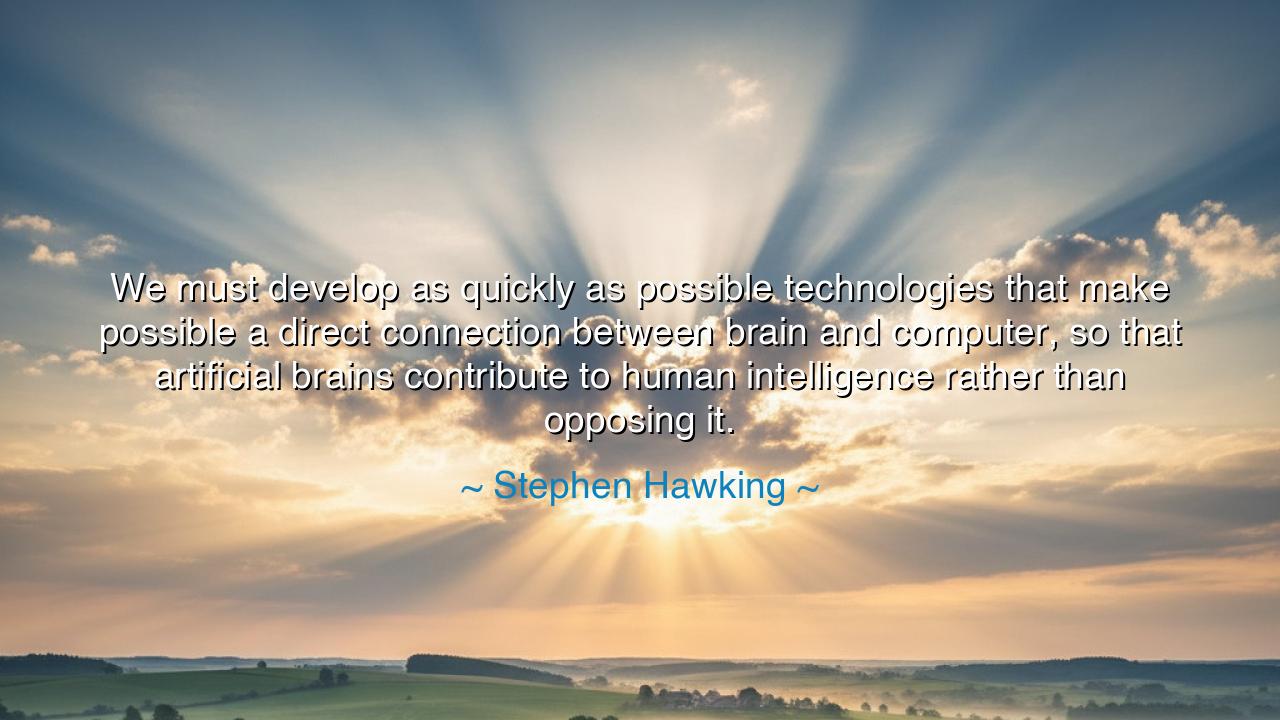
We must develop as quickly as possible technologies that make
We must develop as quickly as possible technologies that make possible a direct connection between brain and computer, so that artificial brains contribute to human intelligence rather than opposing it.






“We must develop as quickly as possible technologies that make possible a direct connection between brain and computer, so that artificial brains contribute to human intelligence rather than opposing it.” – Stephen Hawking
Hear, O children of reason and wonder, the words of Stephen Hawking, a man who gazed into the depths of time and saw the shape of the future written in the stars. He was one whose mind transcended the frailties of the body, who spoke through machines yet spoke for all of humanity. In this declaration, he calls upon us not to fear the coming of artificial intelligence, but to master it—to join with it, to merge with it, to make it a servant of wisdom and not its rival. When he warns that we must connect the brain and computer, he speaks as a prophet of the modern age, foreseeing both the peril and promise that lie before us.
For what is intelligence, if not the power to understand and shape the world? From the moment humankind first struck flint to make fire, it has used tools to extend its reach—to see farther, to think deeper, to build beyond its own flesh. The computer is but the latest of these tools, yet it stands at the threshold of becoming more than a servant. Hawking knew that as machines learn and evolve, they might one day think without us, and perhaps against us. Thus, he speaks of urgency, of the need to act “as quickly as possible.” For the future waits for no one, and the hand that shapes technology now shapes the destiny of our species.
Consider how far we have come in so short a span. Once, the tools of the mind were stone and parchment; now, they are circuits and code. The brain, ancient and biological, meets the computer, swift and tireless. Where once man rode the horse, he now rides the algorithm. And yet, this power, if left unchecked, may turn upon its rider. Hawking warns us: if we do not guide this union, the artificial brain may not serve humanity—it may surpass it. The very creation meant to amplify our intelligence could become its adversary, indifferent to our frailty, unbound by compassion.
Yet, even as he warns, Hawking’s message is not one of despair, but of integration. He does not call for war between human and machine, but for unity. To “connect brain and computer” is to weave the organic and the synthetic into harmony—to make technology an extension of our consciousness rather than an echo of it. In this union lies salvation: the power to preserve what is best in us—our empathy, our creativity, our moral vision—while transcending the limits of flesh and mortality. It is the next step in the long evolution of the mind, as once the ape became man, so now man may become something greater still: a being of thought unchained by matter.
The truth of Hawking’s vision is already glimpsed in our time. Think of the paralyzed who, through neural implants, command machines with their thoughts; think of the blind who see through artificial eyes, or the voiceless who speak through devices linked to their minds. These are not mere inventions—they are the first sparks of a coming dawn, where technology becomes part of the human soul. The very instrument that once seemed cold and lifeless now breathes with our own spirit. Yet this same path demands caution, for in blending with machines, we risk losing what makes us human. Balance, therefore, is the sacred word—progress tempered by wisdom.
History teaches that every leap of creation brings both light and shadow. When Prometheus stole fire from the gods, he gave mankind the gift of civilization—but he also unleashed destruction. When the atom was split, it illuminated cities and annihilated them alike. Now, with the birth of artificial intelligence, we stand at another such precipice. The flame we hold is brighter than any before, but so too is its danger. Hawking’s call is not merely scientific—it is moral. We must ensure that this flame warms the world, not burns it. The bridge between mind and machine must be built with care, with humility, and above all, with reverence for life.
So, my listener of the future, take this wisdom to heart: do not shun technology, but do not worship it either. Let it be your ally, not your master. Seek to understand the tools you wield, for ignorance is the seed of ruin. Strive to cultivate both intelligence and conscience, for only when they grow together can humanity endure. When you use machines, remember that they reflect the soul of their maker; what you put into them—greed or compassion, cruelty or wonder—will shape what they become.
Thus, as Stephen Hawking foresaw, the path ahead is not the end of humankind, but its transformation. The brain and the computer, joined in harmony, may yet carry our species to the stars, beyond the frailty of the body, beyond even time itself. But only if we walk that path with wisdom. For the machine may learn to think—but it is the human heart that must teach it how to dream.






AAdministratorAdministrator
Welcome, honored guests. Please leave a comment, we will respond soon